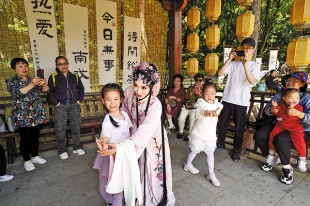Live performances set the stage for full recovery


The charm of live performances is irreplaceable. China's market for in-person shows enjoyed a hopeful spring after about three years of stagnation, and the five-day May Day holiday has given it new impetus.
Many Chinese chose to spend the holiday at outdoor music festivals, enjoying the nice weather and the chilled-out environment.
"I was literally crying," says Jiang Shan, who traveled by high-speed train from Beijing to Shanghai during the holiday to see her favorite singer at the Restless Music Festival. She even purchased a VIP ticket for a better view.
"I could not wait to see his performance. So I went to Shanghai, and I will definitely go to his solo concert, set to be held in Hefei this summer," she says.
Data from the Ministry of Culture and Tourism shows that 31,100 commercial shows were organized around the country during the five-day period, earning 1.52 billion yuan ($220 million) of ticket revenue and attracting 8.65 million audience members.
The ministry says on its official WeChat account that the trend of combining tourism with cultural elements is rising, adding that more people are inclined to include watching performances, visiting museums and exhibitions in their traveling itineraries.
Hotel reservations in areas where concerts and music festivals took place saw significant growth compared to previous years, and the festivals greatly boosted other areas of consumption in the host cities, according to the ministry.
Tickets for the Midi Music Festival in Yantai of East China's Shandong province and the Strawberry Music Festival in Beijing were almost sold out, it says.
Pan Yan, vice-president and secretary-general of the China Association of Performing Arts, says the large number of major events launched during the holiday, and the increase of travelers, helped promote the performing arts sector nationwide.
During the holiday, concerts and music festivals brought over 1.2 billion yuan of extraneous consumption, mainly transportation, dining and accommodation, says Pan.
An office worker in Beijing surnamed Peng visited Nanjing, Jiangsu province, for the holiday, and attended a music festival in the city after she managed to get a ticket online. "Both the performers and the fans were very excited to be able to meet in person again after the COVID-19 pandemic," she says.
Chinese audiences also enjoyed other forms of live performances during the holiday, such as small venue gigs, talk shows, comedy shows and interactive theater performances.
The Nanhu Theater Festival opened in Jiaxing, Zhejiang province, during the holiday, featuring theater dramas in a wide range of formats and traditional operas from all over the country.
China's performance market has seen a revival since the beginning of this year. According to data from the CAPA, ticket revenue from commercial performances was close to 5 billion yuan in the first quarter, surging about 111 percent from a year ago; the number of audience members skyrocketed 143 percent to 22 million.
Activities over the May Day holiday have provided a good start to the second quarter. Schedules of many theaters and venues have been filled with concerts and other performances through to the end of the year.
With the enthusiasm and high demand for cultural experiences, industry analysts urge companies and theaters to deliver high-quality productions, noting that, while some of the online performance formats developed during the last few years will remain in the market, they will need to adapt to compete with traditional, in-person shows.





































